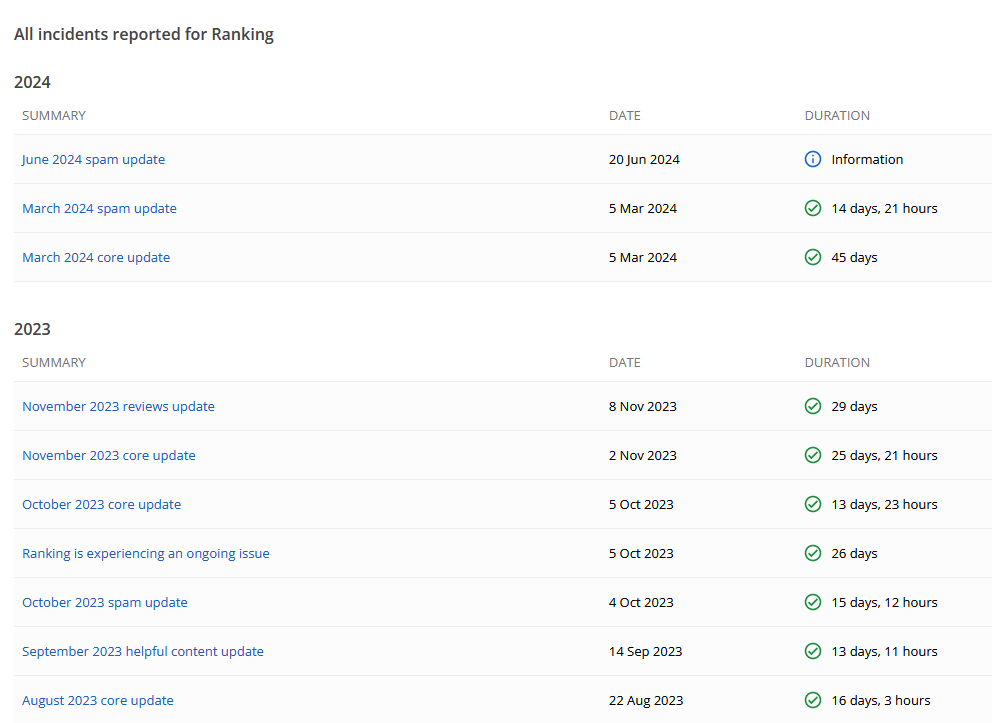What’s Changed in Search?
Updates to Google’s search algorithm over the past twelve months resulted in a seismic shift in the search landscape for many websites. With a desire to offer better search results to users, Google progressively implemented three core changes to search.

Going Up
The Helpful Content Update (HCU) was supposed to highlight search results which would be more helpful to the end user based on the search query. While this did seem to affect some search results, a lesser-known update from Google came out around the time HCU was first being rolled out, the Hidden Gems update.
Hidden Gems gave more prominence to User Generated Content, especially Reddit and Quora posts which Google’s algorithm felt were not only authentic but were particularly relevant to the user. Users and SEO professionals were divided on the usefulness of these results, and “how to remove reddit from search results” became a trending search term on Google.
Going Down
The flipside of the HCU and Hidden Gems updates were the Spam Updates. Despite Google’s best efforts for over twenty years, there were still sites in the search results that weren’t helpful to anybody. Low-quality sites were the direct target of the Spam updates.
Unlike the HCU, which promoted good content to higher in the search results, the Spam update resulted in whole websites being removed entirely from Google. This has also resulted in mixed results, both for the end users and for Google. Some websites which weren’t definitely low-quality were stung by this update, with organic search traffic dropping to almost nothing. Users complained because there is still obvious spam in the search results.
Going Sideways
The third major update Google implemented hasn’t yet affected us here in the UK. AI Overviews (AIO) were rolled out by Google in the US earlier this year. Offering the complete answer to any question directly in the search results using Google’s Gemini artificial intelligence.
This proved to be unpopular among many users, as the results were often flawed. Being told that you should eat one rock per day, or that glue is an appropriate addition to pizza to make the cheese stick better (at least it specified non-toxic glue). Google quickly took their foot off the AI accelerator and reduced AIOs for many searches when they were called out for this. The last couple of weeks have seen AIO becoming more prevalent again, with fewer obvious fails.
However, it wasn’t just users being given potentially dangerous information that resulted in the pushback against AIO. Content creators have been angry that AIO (like many other AI systems out there) is using their content without permission. The whole landscape of Large Language Models and generative AI may actually be about to shift. Just this week some of the biggest labels in the music industry launched a lawsuit against AI software making music based content they own.
Google (and Bing) have answered this accusation by including citations with links to the websites that they get their information from. Content creators have countered that since the AIO offers the whole answer anyway there is no reason for the user to click on the citation.
How Does This Affect SEO?
Search Engine Optimisation is a complex field and no two sites ever implement it in exactly the same way. As such, the consequences to websites of Google’s changes vary dramatically. The biggest impacts were in highly competitive markets, where the target audience is likely to do some research before making a purchase and people don’t have too much loyalty to a particular brand.
Our customers weren’t impacted negatively, but if you follow online SEO communities (like I do), you will have seen countless anecdotes of websites left without traffic, and businesses suddenly bereft of advertising revenue. Were all of these sites spam-laden and low-quality, deserving to have that traffic (and revenue) taken away without warning? Unlikely.
Why weren’t our customers affected? One of the factors Google said was a problem for many affected websites was that the content was obviously written for the search engines and not for end users. This is something that would be difficult to objectively quantify and certainly difficult to detect for Google’s automated systems.
What About AI-Based Search?
One common thread throughout discussions about AIO is that they don’t show the same results as regular search. Analysis shows that this is consistent with AIO. Almost no citation ever offered refers to a website that appears in the “normal” top ten search results.
As our clients aren’t overly focused on the US search market, we don’t have first-hand experience of how this affects traffic (something Google have been thus far reticent to share their own data of with website owners), but since it is inevitable that AIO will eventually be released in the UK we have been paying close attention to what is happening.
There are plenty of hypotheses about how to get your website to show more prominently in AIO, and depending on both your business and the intent of the searcher, having a citation for an AIO could result in more traffic rather than less. Since AIO is obviously still under development, there really isn’t a definitive answer as to how we can “do” SEO for it when it launches on this side of the pond. Recently we’ve seen AIO citing seven year old Reddit posts, satirical websites, and alternative medicine peddling pseudoscience sites.
Did Any of This Make Search Better?
Short answer: Anecdotally, Google’s own users don’t think so.
Long answer: Well, given that Google’s stock price rose by 55% over the past year, one has to assume that those in charge believe so.
However, given that they lost 7% of their global market share as a search engine for desktop users in the 12 months to May this year, it’s possible that they’re going to change their minds soon. Do bear in mind that desktop search share is an important metric, as it’s much easier to change your default search engine on a desktop platform. In fact, the difficulty of changing your default search engine on mobile devices was one of the pieces of evidence brought against Google by the Department of Justice in their current antitrust case.
There are plenty of posts across various social media platforms bemoaning the quality of Google search results, and not only from people whose job it is to work with search engines. Those in the SEO industry are always the first to complain, but when everyday users start to complain, you know there’s a serious issue. When those everyday user complaints make it to the big league, mainstream news outlets, it’s definitely something serious. The Telegraph, Le Monde, The Guardian, The New York Post, and El País have all published stories this year about the quality of Google’s searches declining noticeably.
So What is the Future of SEO?
The future of SEO is the same as the past of SEO;
Plan your strategy around your business objectives.
Pay attention to your data and learn from it.
Pay attention to the search landscape you’re competing in.
Create good, user first content and get it indexed rapidly.
Ensure that the content and context of your website are understandable by spiders.
Work hard for honest, relevant backlinks.
As AI improves its ability to better comprehend what it encounters, the quality of your content will become more and more important. Google have, to date, tried to emulate this sort of comprehension by looking at metrics they could measure (mostly backlinks and user interactions). While these will still be important factors, the genuine quality of the content will become vital as AI comes to dominate all aspects of search.
E-E-A-T (Google’s measure of Experience, Expertise, Authoritativeness, and Trustworthiness) will, if anything, increase in importance. These are the four criteria by which Google judges content and are still the gold standard of ranking factors.
Brand building, always the most difficult aspect of marketing for smaller businesses, will become more vital. Getting your name and values out amongst your target audience has always been the key to online success. But if search becomes more unpredictable as AI becomes more ubiquitous, you’re likely to find every channel for building your brand saturated with those doing the same.
More to the point, you need to pay attention. It’s probably difficult to pay attention to what’s happening with search engines, what’s happening to your website on those search engines, and running a business all at the same time. This is why you really need to speak to someone who does this sort of thing for fun.



